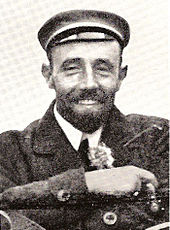Paul von Sternbach
Paul Freiherr von Sternbach zu Stock und Luttach (born July 29, 1869 in Klausen (South Tyrol) , † October 22, 1948 in Bruneck ) was an Austrian politician in South Tyrol.
Life
Paul von Sternbach comes from the family of the Lords von Sternbach , who came from Bruneck-OberAGEN and then also resided in Thaur or Innsbruck-Mühlau and Bludenz-Sonnenberg .
After graduating from the Franziskanergymnasium Bozen , he studied law at the University of Innsbruck from 1888 to 1897. Athesia, the Corps of the South Tyroleans, reciprocated him in 1906. After his legal clerkship in Sterzing , he was appointed to the government council in 1908 and was given the title “Lord and Farmer of Tyrol”. For the Bruneck district he was promoted to a state committee member and from 1902 to 1918 a member of the Tyrolean state parliament .
After some time as a lawyer in Zirl and Mühlwald , he joined the officer corps of the Tyrolean Kaiserjäger in 1913 and received the Imperial and Royal Cross of Merit 3rd class as a first lieutenant in the reserve . In 1916 he became captain of the state rifles in Bruneck ; in addition, he was given honorary citizenship of the communities of Zirl and Mühlwald. During his tenure as civil commissioner at the military general government in Cetinje ( Montenegro ) in 1917, he was appointed councilor .
As a direct representative for the interests of South Tyrol, he was a member of the Austrian Peace Commission when the Saint-Germain-en-Laye Peace Treaty was signed in 1919. There he experienced the loss of South Tyrol for Austria and its connection to Italy . It was in 1924 for the German Association as a member of South Tyrol (Alto Adige) in the Italian Parliament elected, his political mandate because of could fascist oppression but perceive only a very limited extent and was repeated target of political attacks by the Fascist press and its partisans. In 1926/27 he was in close correspondence with the English historian John S. Stephens, who, as a member of the minority commission of the Geneva League of Nations, sought to internationalize the South Tyrol problem.
In 1927 Sternbach's law firm was closed by the Italian authorities, and in 1935 he was threatened with banishment to Sicily , which, however, was averted after international protests.
As a leading Dableiber and active opponent of the South Tyrolean option Sternbach also came to the attention of the Nazis , which took him to the occupation of South Tyrol on September 8, 1943, first in Bolzano and then in Innsbruck interned. After the end of the war, he became involved in the South Tyrolean People's Party from 1947 .
literature
- Phoebe W. Busch: Baron von Sternbach and the Struggle for South Tyrol , 2 vol., Phil. Diss. Denver, 1996.
- Christine Roilo : Sternbach Paul Anton Maria Frh. Von. In: Austrian Biographical Lexicon 1815–1950 (ÖBL). Volume 13, Verlag der Österreichischen Akademie der Wissenschaften, Vienna 2007–2010, ISBN 978-3-7001-6963-5 , p. 232 f. (Direct links on p. 232 , p. 233 ).
- Lothar von Sternbach: Paul Freiherr von Sternbach on the 50th anniversary of his death. In: « Der Schlern » 72 (1998), pp. 547-578.
Web links
- Literature by and about Paul von Sternbach in the catalog of the German National Library
Individual evidence
- ↑ Sternbach residence in Bruneck , burgen-adi.at
- ↑ Josef Bertsch: Three red-covered towers on three green hills ... - Facts and assumptions about the Thaurer municipal coat of arms . In: the Schlossbichler , community newspaper Thaur, No. 32, 8th year, April 2012, p. 3ff. ( thaur.tirol.gv.at ; PDF)
- ↑ Kösener Corpslisten 1960, 72/147.
- ^ Hannes Obermair : Danger Zones - the English historian John Sturge Stephens (1891-1954), Italian fascism and South Tyrol . In: Richard Faber , Elmar Locher (ed.): Italian fascism and German-speaking Catholicism . Würzburg: Königshausen & Neumann 2013. ISBN 978-3-8260-5058-9 , pp. 138–162, reference pp. 146f.
| personal data | |
|---|---|
| SURNAME | Sternbach, Paul von |
| ALTERNATIVE NAMES | Sternbach zu Stock and Luttach, Paul von; Ritter, Paul (pseudonym) |
| BRIEF DESCRIPTION | Austrian-Italian politician (South Tyrol), member of the Tyrolean state parliament, member of the Camera dei deputati |
| DATE OF BIRTH | July 29, 1869 |
| PLACE OF BIRTH | Klausen (South Tyrol) |
| DATE OF DEATH | October 22, 1948 |
| Place of death | Brunico |
